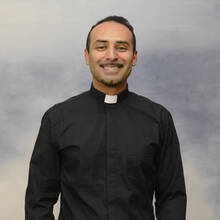Has God ever rescued you?
Where should Christ’s disciples seek leadership? This Sunday’s readings indicate that it will not be among the powerful of this world. It is as missionaries and through persecution that the apostles provide the best leadership. In every way, Peter and Paul were like the “poor ones” of this Sunday’s psalm, in need of constant grace and rescue from above.
“Taste and see how good the LORD is; blessed the one who takes refuge in him” (Ps 34:9).
What is your motivation to follow Jesus?
Where are you being poured-out like a libation for the kingdom?
Can you recall a time that the hand of God rescued you?
This Sunday’s first reading from Acts introduces King Herod as the worldly leader in charge of an escalating persecution of the followers of Jesus. “In those days,” writes Luke, “King Herod laid hands upon some members of the Church to harm them” (Acts 12:1). This is not the same Herod who ruled when Jesus was born. The Herodian family had strong ties to Rome and produced many rulers with that name. The Herod mentioned in this Sunday’s reading was also called Marcus Julius Agrippa I (10 BCE–44 CE) and was the grandson of Herod the Great. He was granted the title “king” from his friend, the emperor of Rome, Gaius Caligula, who placed him in charge of Judea around 37 CE. Christian and Roman historical sources attest to the deeds of this family and their propensity for cruelty and bloodshed. “He [Herod] had James, the brother of John, killed by the sword, and when he saw that this was pleasing to the Jews he proceeded to arrest Peter also” (Acts 12:2-3).
The rest of this Sunday’s first reading recounts an angelic “search and rescue mission” of an imprisoned Peter. But the rescue, recounted in detail, is clearly a miraculous divine intervention told in such a way that no one would doubt the cause of Peter’s release. “Now I know for certain,” cried Peter, “that the Lord sent his angel and rescued me from the hand of Herod” (Acts 12:11). God saved the poor man, and that experience provided the credibility Peter needed to witness and advance the word of God. In other words, it was because of persecution that the word of God advanced, not in spite of it.
This Sunday’s second reading recounts Paul’s own self-offering with the same themes of distress and rescue, all for the sake of advancing the word of God. In Paul’s own words, “The Lord stood by me and gave me strength, so that through me the proclamation might be completed” (2 Tm 4:17). Paul saw his life as a “poured-out libation,” an ancient term for a sacrificial offering of wine that was given in full. He had poured out his entire life so that the word of God may advance.
For both Peter and Paul, the experience of full self-offering was an experience of grace. They recognized in Jesus Christ the living voice of God, and they offered their entire lives to helping others hear that same voice. When they encountered suffering, they trusted that it would lead to God’s intervention. When that same saving God continued to call them into new situations of opposition, they sought out ways to advance the Gospel even then. This is the lesson of leadership among Christ’s disciples, to be ever at the task of sharing the Gospel, finding moments of grace even in hardship.







